Candles of Song
July 16, 2012 by Sheva Zucker
Candles of Song: Yiddish Poems about Mothers Kadya Molodowsky
Yiddish poems about mothers, in memory of my mother, Miriam Pearlman Zucker, 1914-2012.
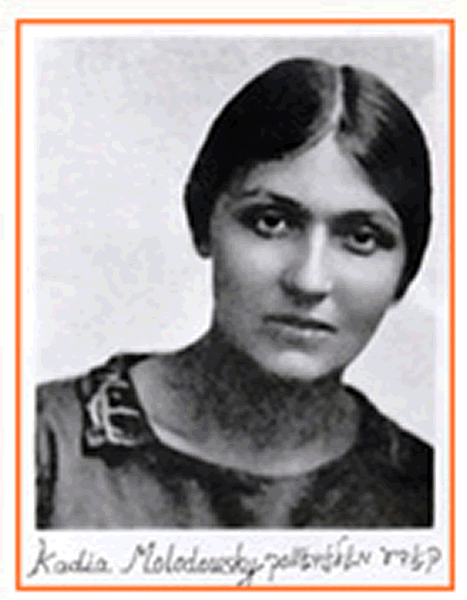
Photo of Kadya Molodowsky
Kadya Molodowsky (1894-1975) was born in Bereze Kartuskaya, White Russia in 1894. Although a girl, she studied Khumesh (Pentateuch) with her father, a melamed, a teacher, and later both Gemore and Russian with private tutors. In the 1920’s she settled in Warsaw and worked by day as a teacher in a socialist Yiddishist Tsisho school, and in the evenings in a Hebraist community school. Herself a fervent Zionist, she married a Communist, the historian and literary critic Simkhe Lev, and they lived, from 1935 on, for the most part, in America, with a three year interval in Israel. The couple had no children.
Generally considered the foremost female writer in modern Yiddish literature, and a first-rate and prolific poet by any standard, she published eight volumes of poetry, a collection of short stories, several novels, and also edited a literary journal Svive in New York.
Molodowsky’s work reveals a woman striving to reconcile the opposing forces of religion and modernity, a realist and a skeptic who longed for miracles, a philosophic thinker who tempered deepest tragedy with irony and humor, and a spiritual seeker who despaired in God and humanity. Paper Bridges (1999), translated and edited by Kathryn Hellerstein, offers a comprehensive selection of her best poetic work in English and was voted one of the 100 best Jewish books by a panel at the National Jewish Book Center.
Here, Froyen-Lider I and Froyen-Lider VIII by Kadya Molodowsky, read by Sheva Zucker:
- No Comments
July 9, 2012 by Sheva Zucker
Candles of Song: Yiddish Poems about Mothers Mani Leyb
Yiddish poems about mothers, in memory of my mother, Miriam Pearlman Zucker, 1914-2012.
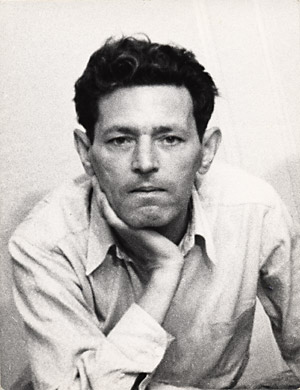
Photo of Mani Leyb
Mani Leyb (1883-1953) was the pseudonym of Mani Leyb Brahinsky. He was born in Niezhyn, (Chernigov district, Ukraine). At the age of 11 he left school to be apprenticed to a bootmaker and was twice arrest for “revolutionary activities” while still in his teens.
He emigrated to New York in 1906 where he began publishing poems in the Forverts and Fraye arbeter shtime. He worked as a shoe and boot-maker until he contracted tuberculosis and lived in a sanatorium for two years (1932-1934).
He was a leading figure in Di Yunge (the Young Ones), a poetry group which, in rebellion against the earlier worker poets, placed individual mood and sensation at the heart of poetry. The appeal of simplicity as an aesthetic goal attracted him to folks songs and folk motifs, and to the writing of children’s verse.
In 1918 he published three volumes of poetry – Lider (poems), Yidishe un slavishe motivn (Jewish and Slavic motifs), and Baladn (Ballads). Some of these and later poems were published posthumously in 1955 in Lider un Baladn (Poems and Ballads). After an unhappy marriage and five children he began a relationship with with the Yiddish poet Rashelle Veprinski which lasted from the1920s until his death in 1953.
Here, Mayn Mame, by Mani Leyb, read by Sheva Zucker:
- No Comments
June 12, 2012 by Sheva Zucker
Candles of Song: "From My Slender Limbs" and "If.." by Rashel Veprinski
Yiddish poems about mothers, in memory of my mother, Miriam Pearlman Zucker, 1914-2012.
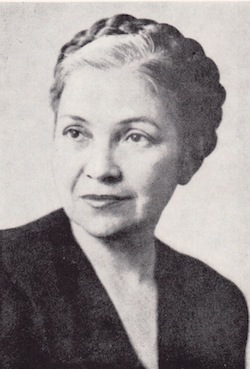
Photo of Rashel Veprinski
Rashel Veprinski (1896-1981) was born in the town of Ivankov, not far from Kiev, in Ukraine. She came to New York in 1907, and at thirteen she went to work in a shop. At fifteen, she began writing poetry, and was first published in 1918 in the journal Di naye velt (The New World). She wrote several books of poetry, among them Ruf fun foygl (The Call of the bird), 1926, Di Palitre (The palette), 1964, Tsum eyntsikn shtern (To the single star), 1971 as well as an autobiographical novel, short stories, and articles and was published regularly in Yiddish periodicals. From the 1920s until his death in 1953, she lived with the famous Yiddish writer Mani Leyb.
Here, Fun Mayne Shlanke Glider, by Rashel Veprinski, read by Sheva Zucker:
From My Slender Limbs
- No Comments
June 5, 2012 by Sheva Zucker
Candles of Song: Yiddish Poems about Mothers Gitl Schaechter-Viswanath
Yiddish poems about mothers, in memory of my mother, Miriam Pearlman Zucker, 1914-2012.
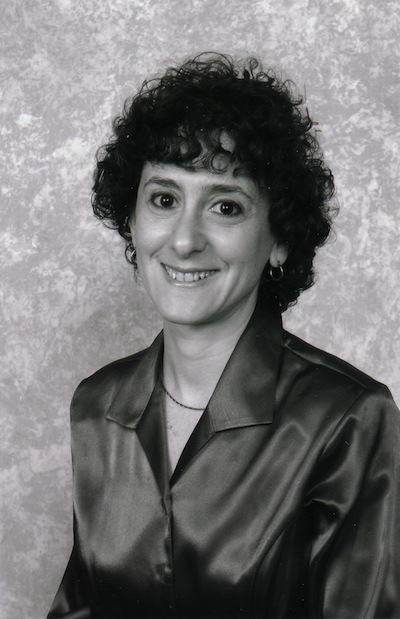
Photo of Gitl Schaechter-Viswanath
Gitl Schaechter-Viswanath (1958 – ) was born in the Bronx, New York and grew up in a Yiddish-speaking, staunchly Yiddishist home. She studied in the Sholem Aleichem Folkshul 21, United Mittleshul and Jewish Teachers Seminary, where she graduated with a degree in Jewish literature. She also earned degrees in Russian (Barnard College), nursing (Columbia University) and health administration (New York University), and currently works as a clinical consultant in long-term care. She has been active in the Yiddish movement her entire life, and has worked as editor for several Yiddish magazines. Since 2005 she has been stylistic editor of Afn Shvel, the periodical of the League for Yiddish. She lives in Teaneck, New Jersey, and is the mother of three Yiddish-speaking children. She has published one volume of poetry, Sudden Rain: Yiddish Poems (Israel Book, Tel Aviv, 2003).
Here, Mame, by Gitl Schaechter-Viswanath, read by Sheva Zucker:
- No Comments
May 29, 2012 by Sheva Zucker
Candles of Song: "My Child Knocks" by Rajzel Zychlinksy
Yiddish poems about mothers, in memory of my mother, Miriam Pearlman Zucker, 1914-2012.
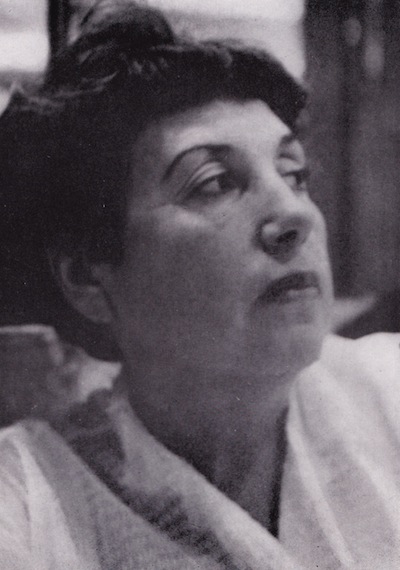
Photo of Rajzel Zychlinksy
Rajzel Zychlinksy (1910-2001) was born in Gombin, Poland in 1910. Her first book of poems, Lider (Poems), published in 1936, included a very laudatory foreword by the celebrated poet Itsik Manger. She and her husband, the psychiatrist and author, Dr. Isaac Kanter, left their home in Warsaw during the Second World War and took refuge in Russia where their son Marek was born.
In 1951, Zychlinksy emigrated to New York. She lived there until the last few years of her life, when she moved to Berkeley, California, to join her son. She published several volumes of poetry in Yiddish, among them, Tsu loytere bregn (To clear shores), 1948, Shvaygndike tirn, (Silent doors), 1962), Di November-zun (The November sun), 1977 and Naye lider (New Poems), 1993. In 1975 she was awarded the prestigious Manger Prize for Yiddish Poetry. The Holocaust is a major theme in her work.
A fine selection of her poems has been published in English in the book God Hid His Face: Selected Poems of Rajzel Zychlinsky, translated by Barnett Zumoff, Aaron Kramer, and Zychlinsky’s son, Marek Kanter.
Here, Mayn Kind Klapt, by Rajzel Zychlinksy, read by Sheva Zucker:
- No Comments
May 23, 2012 by Sheva Zucker
Candles of Song: Yiddish Poems about Mothers Rajzel Zychlinksy
Yiddish poems about mothers, in memory of my mother, Miriam Pearlman Zucker, 1914-2012.

Photo of Rajzel Zychlinksy
Rajzel Zychlinksy (1910-2001) was born in Gombin, Poland in 1910. Her first book of poems, Lider (Poems), published in 1936, included a very laudatory foreword by the celebrated poet Itsik Manger. She and her husband, the psychiatrist and author, Dr. Isaac Kanter, left their home in Warsaw during the Second World War and took refuge in Russia where their son Marek was born.
In 1951, Zychlinksy emigrated to New York. She lived there until the last few years of her life, when she moved to Berkeley, California, to join her son. She published several volumes of poetry in Yiddish, among them, Tsu loytere bregn (To clear shores), 1948, Shvaygndike tirn, (Silent doors), 1962), Di November-zun (The November sun), 1977 and Naye lider (New Poems), 1993. In 1975 she was awarded the prestigious Manger Prize for Yiddish Poetry. The Holocaust is a major theme in her work.
A fine selection of her poems has been published in English in the book God Hid His Face: Selected Poems of Rajzel Zychlinsky, translated by Barnett Zumoff, Aaron Kramer, and Zychlinsky’s son, Marek Kanter.
Here, Mame, by Rajzel Zychlinksy, read by Sheva Zucker:
- No Comments
May 14, 2012 by Sheva Zucker
Candles of Song: Yiddish Poems about Mothers Malka Heifetz Tussman
Yiddish poems about mothers, in memory of my mother, Miriam Pearlman Zucker, 1914-2012.
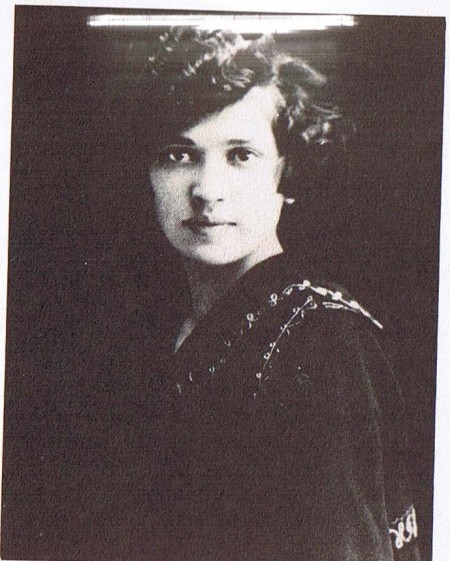
Photo of Malka Heifetz Tussman
Malka Heifetz Tussman (1896-1987) was born in Bolshaya-Khaitcha, Ukraine. She wrote her earliest poetry in Yiddish and Russian. She immigrated to the US at the age of 16 joining family in Chicago and began writing poetry in English but soon switched to Yiddish. She made her literary debut in 1918. She became a teacher in a secular Yiddish school in Milwaukee and studied at the University of Wisconsin. Later she, her husband and two sons moved to Los Angeles. In 1981 she was awarded the prestigious Itsik Manger Prize for Yiddish Poetry in Tel Aviv. Her poetry, according to the introduction in With Teeth in the Earth: Selected Poems of Malka Heifetz Tussman, translated and edited by Marcia Falk, “Frank and exploring, innovative in language – reveals the richness and complexity of a woman’s life.” She died in Berkeley, California. Heifetz Tussman published poems, stories and essays in Yiddish magazines both in America and Europe. Her six volumes of published verse include Lider (Poems), MIld mayn vild (Mild, my Wild), Shotns fun gedenken (Shadows of remembering), Bleter farn nit (Leaves don’t fall), Unter dayn tseykhn (Under your sign), and Haynt iz eybik (Today is forever).
Here, Vi Azoy Bistu Klug Gevorn, Mame, by Malka Heifetz Tussman, read by Sheva Zucker:
- No Comments
April 30, 2012 by Sheva Zucker
Candles of Song: Yiddish Poems about Mothers Rashel Veprinski

Photo of Rashel Veprinski. From Tsum eyntsikn shtern (To the Lone Star), Tel-Aviv, 1971.
A New Kind of Kadish
On January 25, 2012 (Shevat 1) my dear, sweet, gentle mother passed away. Although it is customary in the Jewish tradition to say kadish for 11 months after the death of a parent and although I do belong to a conservative synagogue it somehow did not feel natural for me, an agnostic, to say kadish for my mother, a Canadian born Yiddish speaker, also an agnostic brought up in the tradition of secular Yidishkeyt. However, I am doing it (not totally regularly) and while I do find the act somewhat meaningful it does not essentially express who I am as a Jew and who she was.
I decided, therefore, to create a blog of Yiddish poems about mothers in her memory. Each week I shall post one Yiddish poem, both in Yiddish and in transliteration, with an accompanying English translation. Some of the translations will be my own, others will be by other people. Sources will always be noted. Each poem will be preceded, wherever possible, by a brief biography and photo of the poet, as well as a recording of the poem in Yiddish.
I have chosen to call this blog “Candle of Song” after a line in a poem by Rashel Veprinski (Piously as my mother the waxen wicks,/I light my candle of song). To me it is a beautiful metaphor of how the pious act of lighting Sabbath candles got transformed for the poet into the, for her, equally spiritual act of writing Yiddish poetry. The title is for me also evocative of yortsayt-likht (memorial candles) although it was not the poet’s intention. With this in mind, I have chosen to make Veprinski’s poem “Frum” (Piously) my first offering.
Rashel Veprinski (1896-1981) was born in the town of Ivankov, not far from Kiev, in Ukraine. She came to New York in 1907, and at thirteen she went to work in a shop. At fifteen, she began writing poetry, and was first published in 1918 in the journal Di naye velt (The New World). She wrote several books of poetry, among them Ruf fun foygl (The Call of the bird), 1926, Di Palitre (The palette), 1964, Tsum eyntsikn shtern (To the single star), 1971 as well as an autobiographical novel, short stories, and articles and was published regularly in Yiddish periodicals. From the 1920s until his death in 1953, she lived with the famous Yiddish writer Mani Leyb. (Those wishing to read the biographies in Yiddish can do so at my blog.)
Here, Frum, by Rashel Veprinski, read by Sheva Zucker:
- No Comments
 Please wait...
Please wait...